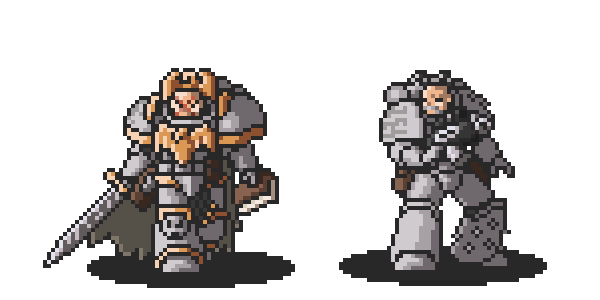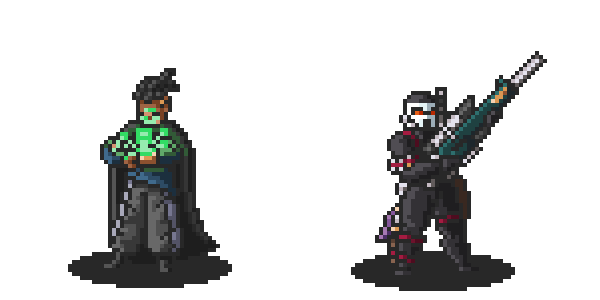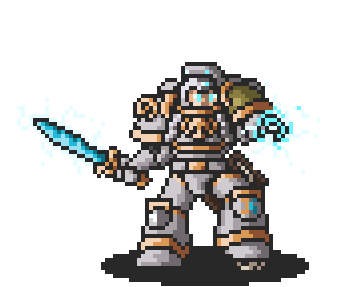
The Story
The annals of the Horus Heresy are littered with legends about inspiring heroes and insidious villains, about those who brought about great victories or grand tragedies. There are also the millions that are forgotten by history, only remembered as numbers on the tallies of the lost, ground to dust between the wheels of fate. And then there are those that never had a chance to be remembered because their deeds were purposefully masked by shadows, those that changed the course of history while being shrouded by the dark. These are their stories.
This Omnibus is the story of Nathaniel Garro and the valorous crew of the Eisenstein, rushing from the treachery of Isstvan to alert the Emperor to the daggers aimed at his back. It is the beginning of the story of the Knights-Errant, the ghosts in grey that have lost their brotherhoods and become agents in a war of shadows. It is the story of the spies and assassins that thought to strangle the war in its crib and avert catastrophe with a single bullet. It is the story of an Imperium at war with itself, from the lowliest clerk to the highest general, of worlds and villages torn asunder in the fires of rebellion.
The shadow of the Warmaster stretches far, and none can escape its reach.
Reading Order
- Flight of the Eisenstein
- The Voice (ToH)
- Forgotten Sons (AoD)
- Liar's Due (AoD or LW)
- The Final Compliance of 63-14 (EoT)
- Nemesis
- Garro: Weapon of Fate - Ch. 1-8
- The Gates of Terra (TSW)
- Ghosts Speak Not (TSW)
- Army of One (TSW)
- The Watcher (TSW)
- Lost Sons (TSW or LW)
- Child of Night (TSW or LW)
- All That Remains (WwE)
- Patience (TSW)
* Chapters 1-8 of Garro: Weapon of Fate are a novelization of the four audio dramas Garro: Oath of Moment, Garro: Sword of Truth, Burden of Duty and Garro: Ashes of Fealty. You could alternatively listen to these instead of reading the novelization. For additional notes on the Garro novel/anthology, see “Why this Reading Order?” below.
** The Watcher was originally produced as an audio drama and only later published as a short-story.
Why this Reading Order?
This the first of four "Shadow of the Warmaster"-Omnibuses, which track Horus' path after the opening trilogy (see Heresy Rising) from Isstvan III all the way to Terra. This first Shadow of the Warmaster Omnibus isn't about the Sons of Horus and their primarch themselves, though, but is rather a look at the effects of Horus' declaration of war on the Imperium and the reaction of various forces that aren't the Legiones Astartes.
The Heresy as a book series is certainly not without its flaws. One fair point of criticism, in my opinion, is that the series spends not enough time apart from the battlefields and their gods of war, the Space Marines and the Primarchs. Sure, most novels have at least a few baseline-human characters and the authors do their best to give flavour and vitality to the variety of human civilization across the Imperium, but the focus is still mostly on The Big Events, The Big Battles and The Big Guys. And that's fair enough, because there's enough to chew through on that front, what with eighteen Legions all demanding their story to be told across several years of conflict. Still, I think there's lots of fresh and interesting material to be mined from everything that's going on beyond the battlefields and starships during an intergalactic civil war: the human tragedies, the reactions of the civilian population, the shadow plays, the assassinations and the politics.
To quote Laurie Goulding’s insightful afterword from The Silent War:
The Horus Heresy did not (contrary to misguided-yet-apparently-popular opinion) begin at Isstvan III, jump to Isstvan V, swing through Prospero, Signus Prime and Calth before screeching over the finish line with the Siege of Terra. Aside from being a war that was fought in almost every populated system across the whole galaxy at one time or another, the Heresy lasted for over seven years – there would have been countless assassinations, propaganda campaigns, cyber-attacks, false flag operations, supply disruptions, aborted campaigns, precision strikes, terrorism, piratical raids, counter-insurgency and general sabre rattling from both sides. You know. Like in real wars.

The Voice, Ghosts Speak Not and Patience focus on the witch-hunting Black Ships and the Sisters of Silence. Forgotten Sons and The Final Compliance of Sixty-Three Fourteen are about worlds that are still undecided about which side to join in the civil war (something that comes up in Nemesis, too). Liar's Due is a rare story that focuses exclusively on civilians, who are living on a backwater world and are caught in the wave of panic and confusion that precede the forward-moving warzones. Many of the stories live in the shadow of Malcador the Sigillite, the grey eminence on Terra that works tirelessly from the shadows to beat the traitors in a silent war of cloaks and daggers.

The first novel of the Omnibus is Flight of the Eisenstein, which was the first novel to be released after the opening trilogy back in 2007. It details the legendary escape of the ship Eisenstein from the Purge on Isstvan III (see Galaxy in Flames), filled with loyalist elements from Legions that swore fealty to the Warmaster. Captain Nathaniel Garro of the Death Guard leads this escape and in the aftermath becomes the first of the Knights-Errant, Malcador’s chosen warriors against the growing tide of darkness. From that point onward, Garro and the Knights-Errant will be a continuing presence all across the Heresy series, with a boatload of short-stories and a dedicated series of audio dramas of their own (more on that below). This Omnibus, especially the short-stories in its second half, is a chronicle of the birth of these ghosts in grey that Malcador picks up from all across the Legions to become a new weapon for a new age.

The second novel Nemesis is about a group of Imperial Assassins attempting the impossible: killing the Warmaster himself and ending the war before it has really begun. I recently re-read Nemesis after a decade had passed and really enjoyed it, particularly for how different it felt from other Heresy novels. With its bleak tone and dedication to the civilian parts of the Imperium it almost read like a precursor to the Warhammer Crime imprint launched in 2019. I wrote a guest entry on trackofwords.com about my experience with it, which you can read here. It's a shame that, for all it's grandiosity and humongous size, we didn't get more novels like this from the Heresy series.

A note on splitting up Garro: Weapon of Fate: this book, which details the journey of Nathaniel Garro after the events of Flight of the Eisenstein, is a weird novel. It is technically a novel, not an anthology, but that novel is a novelization of what used to be a series of six distinct audio dramas (Garro: Oath of Moment, Garro: Legion of One, Garro: Sword of Truth, Garro: Shield Lies, Burden of Duty and Garro: Ashes of Fealty) and a limited edition novella (Vow of Faith) which were all released over the course of half a decade - so it is also kind of an anthology. Because of this hybrid nature, the novel moves along a wide range of the series' timeline and features several characters that will move over into other stories. There was also a major character reveal in the audio drama Garro: Legion of One, also now bundled into the novelization, which many readers of the Heresy originally missed because they weren’t following the audio publications.
I couldn’t find a good way to place the novel as a whole. For example, the chapters that cover the events of Garro: Legion of One should definitely be read before the novel Vengeful Spirit, while the later chapters that basically reprint the aforementioned novella are set way later on the timeline and are best read afterwards. My solution is to split Garro: Weapon of Fate in three parts along its chapters 1-8, 9-14 and 15-21. The first part is a novelization of four of the audio-dramas, the second of the other two audio-dramas and the third is basically a reprint of the novella Vow of Faith. I encourage readers to take a break after each of these parts and read the novel in three pieces at the recommended points of Shadow of the Warmaster I and II.
Q: Why is the novel Flight of the Eisenstein included here again, despite it already being part of the preceding omnibus?
A: My self-set goal for the omnibuses is that they should succeed on two standards, a two-fold goal that mirrors the task the authors had when writing the novels themselves: every instalment should work as a piece of the wider puzzle of the series, but should also tell a satisfying story of its own. So while I give all these instructions about required reading, fitting follow-ups and the whole flow-chart with good reason, I think the omnibuses should also be worthwhile reads if picked out-of-order. If a reader has heard about a certain battle of the Heresy or is just very interested in a particular Legion or primarch, they might decide to just jump straight into a given omnibus that’s explicitly about that without bothering with recommended prequels. I'd like to make it worth their while, and some stories simply aren’t complete without certain novels, in this case the story of Garro without Flight of the Eisenstein. If you have already read a novel that you come across a second time, you can of course just ignore the second inclusion and go straight for the following stories.
Additions from 'The Primarchs' & 'Horus Heresy Characters'
Mortarion: The Pale King by David Annandale takes a look at the XIVth Legion and their primarch prior to their alliance with Horus' rebellion. Showing Garro's former master and his Legion before they threw their lot in with Horus was something that was for missing for most of the series, so if you're coming out of Flight of the Eisenstein, are interested in the Death Guard and don't want to wait for The Buried Dagger way down the line, this book might scratch that itch. From Warhammer Community: 'Having only recently taken command of the Death Guard, Mortarion is sent to pacify the Galaspar System, whose leaders greedily enrich themselves at the expense of their population. The response is so swift and brutal that even the Imperium baulks at the carnage, although Mortarion shows no sign of remorse.'
The short story Eater of Dreams by Marc Collins (only available as an eShort) is a follow-up to Child of Night that further deepens the character of Fel Zharost.
Required and Recommended Reading
This can be read directly after the opening Omnibus Heresy Rising.
Follow-Up
This omnibus is the first of the four Shadow of the Warmaster-omnibuses. Its direct sequel is Shadow of the Warmaster II: Lords of Death, which continues the story of the Knights-Errant and the Sons of Horus. Some of the events from Lords are set way later in the Heresy, though, so it'd make sense to read some other Omnibuses inbetween to get a sense of what's going on everywhere else (see the "Required and Recommended Reading"-paragraph for Lords of Death).
While Rogal Dorn isn't the main character of any of the stories collected here, he is a continuous presence throughout and I'd argue that his appearances in the stories collected here basically form Act 1 of his series-long character-arc. Act 2 of his story is told in Scale and Stone.
In general, I’d recommend reading all of the four Phase II Omnibuses (Shadow of the Warmaster I; Shattersong; Shadow Crusade I; The Burning of Prospero) at some point before proceeding into the later Phases, no matter what road you'd like to pursue. All of them cover important events for the series (the flight of the Eisenstein and the formation of the Knights-Errant; the Dropsite Massacre of Isstvan V and its fall-out; the corruption of the Word Bearers and the Battle of Calth; the destruction of Prospero) and introduce characters that will be recurring players all across the series.
Once you've read all of them, you can either proceed to one of their Follow-up omnibuses or jump into one of the Phase III-omnibuses that don't have a direct prequel: Omnissiah I: Death of Innocence, Angels of Darkness or Anvil of War.
Required Books
Novels (in order of appearance)
- Flight of the Eisenstein
- Nemesis
Anthologies (in order of appearance)
- Age of Darkness (AoD)
- Tales of Heresy (ToH)
- The Silent War (TSW)
- War Without End (WwE)
- Eye of Terra (EoT)
- ALTERNATIVE: Lupercal's War (LW) (s. notes below)
A note on anthologies: Listed above alongside the respective novels are those anthologies that together contain every short-story and novella listed in the Reading Order of this Omnibus. Instead of buying whole anthologies, you could also buy any of the individual stories of the Reading Order as an individual eBook. The price per story is higher when buying individual eBooks compared to buying them as part of an anthology.
An alternative source for Liar's Due, Lost Sons and Child of Night is the anthology Lupercal's War (LW). It was released as a "Start Here" option for readers alongside the 2nd edition of the Horus Heresy tabletop game in 2022. The collection contains 18 short stories picked from across the numbered Horus Heresy anthologies as well as 3 stories that were previously only available as eShorts (Child of Chaos, Bloodhowl & Champion of Oaths).
Beyond the Heresy
The following are recommendations from other series and the wider Black Library canon. If you are interested in the characters, factions or themes that were part this omnibus, the following books might also be to your liking.
Books from the 41st millenium:
-
Inquisition-series by Dan Abnett, starting with Xenos
- Xenos by Dan Abnett was the first "domestic 40k"-novel - novels that were set away from the big battlelines and more focused on the actual day-to-day life in the Imperium, the intricate politics, the conspiracies, the small-scale cults, the capers and the procedurals. Xenos became the first in a trilogy of books about Inquisitor Gregor Eisenhorn. Abnett followed this up with a second Inquisition-trilogy, this time about Eisenhorn's former protegé Gideon Ravenor (starting with Ravenor), and later by a third trilogy (the Bequin-trilogy, starting with Pariah) which builds on both and completes the trilogy of trilogies. The final book of the Bequin-trilogy, Pandaemonium, is presumably on Abnett's To-Do-List for 2023. There are omnibus editions available both for the Eisenhorn-trilogy as well as the Ravenor-trilogy. If anything deserves the term of "classic" in terms of Black Library fiction, it's these. Great stuff.
-
Inferno! Presents: The Inquisiton, an anthology of Inquisition-shorts
- An anthology of short stories by a mixture of authors both new and old dedicated to the various enterprises and characters of the Emperor's Holy Inquisition, always on the hunt for mutants, heretics and aliens (or, quite often, their rogue colleagues).
-
The Warhammer Crime range, for example Bloodlines by Chris Wraight or Grim Repast by Marc Collins
- Black Library launched Warhammer Crime (alongside Warhammer Horror) in 2020, a new imprint that should become an umbrella for stories dedicated to "domestic 40k", specifically stories about the crime-ridden underbelly of the hive city Varangantua. The range is explicitily about small scale stories about enforcers, thieves, murderers, gangsters and detectives. For an overview, here's an article about 'The Range So Far' from September 2021.
-
Assassinorum: Kingmaker by Rober Rath
- This novel from 2022 is about the joint operation of a three-headed Execution Force to eliminate the monarch of a Knight household that Imperial intel suspects to have gone rogue. Kingmaker reads almost like a thematic sequel to Nemesis and really delivers on the pitch of "team of supremely skilled but divisive hitmen gets tasked with an impossible assassination job". Beside a great spy thriller and Assassins novel it also doubles as a Knight novel, spending lots of time and care on the intricate politics and family feuds of the target feudal world. Highly recommended. Here's author Robert Rath talking about the spy novels that inspired Kingmaker